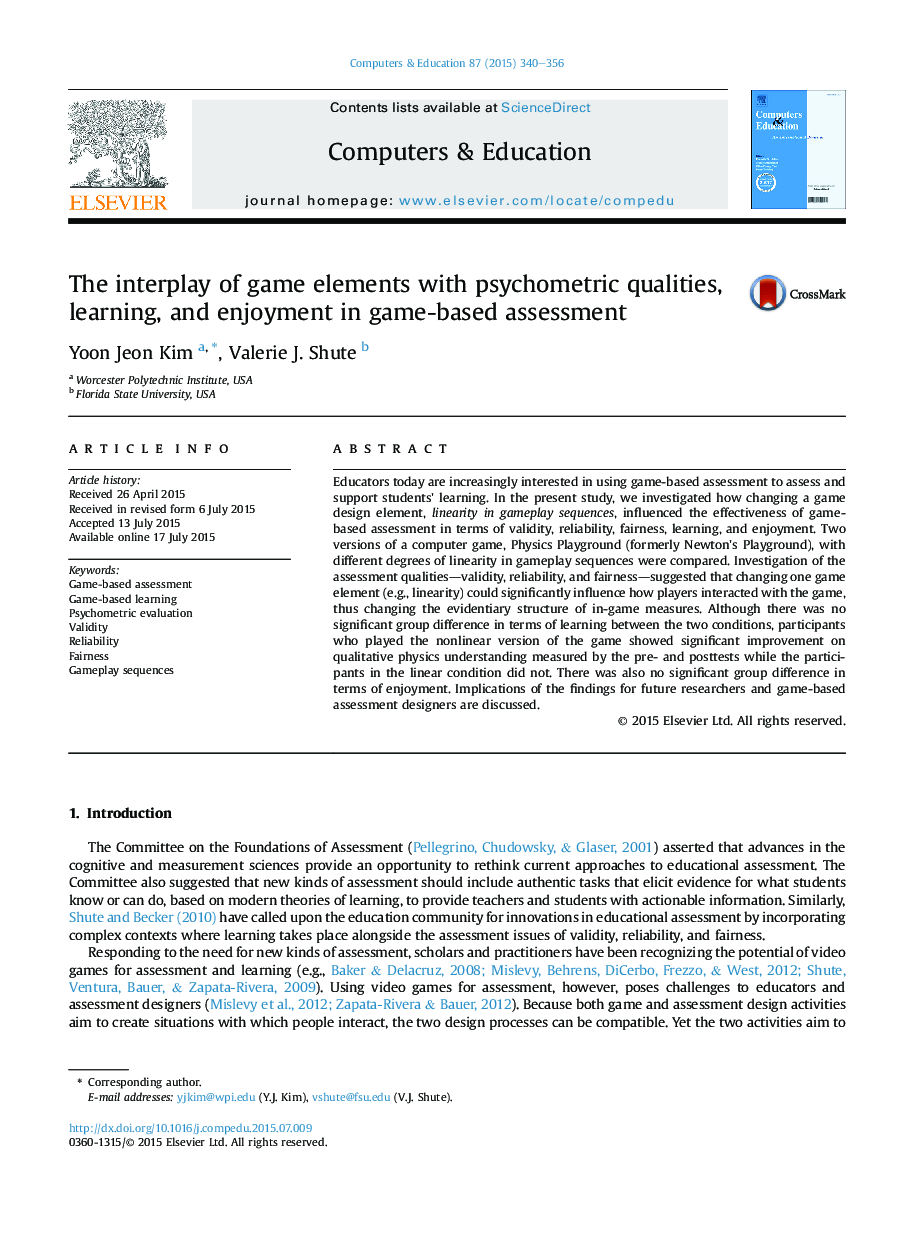| کد مقاله | کد نشریه | سال انتشار | مقاله انگلیسی | نسخه تمام متن |
|---|---|---|---|---|
| 6835053 | 618169 | 2015 | 17 صفحه PDF | دانلود رایگان |
عنوان انگلیسی مقاله ISI
The interplay of game elements with psychometric qualities, learning, and enjoyment in game-based assessment
ترجمه فارسی عنوان
تعامل عناصر بازی با کیفیت روان سنجی، یادگیری و لذت بردن در ارزیابی مبتنی بر بازی
دانلود مقاله + سفارش ترجمه
دانلود مقاله ISI انگلیسی
رایگان برای ایرانیان
کلمات کلیدی
ارزیابی مبتنی بر بازی، یادگیری مبتنی بر بازی، ارزیابی روان سنجی، اعتبار، قابلیت اطمینان، عادلانه، دنباله های گیم پلی،
ترجمه چکیده
امروزه امروزه آموزشگران به استفاده از ارزیابی مبتنی بر بازی برای ارزیابی و حمایت از یادگیری دانش آموزان علاقه مند هستند. در مطالعه حاضر، ما بررسی کردیم که چگونه عنصر طراحی بازی، خطی بودن در توالی های گیم پلی بازی را تحت تاثیر قرار می دهد، تأثیر بر ارزیابی مبتنی بر بازی را از لحاظ اعتبار، قابلیت اطمینان، عدالت، یادگیری و لذت برده است. دو نسخه از یک بازی کامپیوتری، زمین بازی فیزیک (که قبلا در زمین بازی نیوتن بود) با درجه های گوناگون خطی بودن در دنباله های گیم پلی مقایسه شد. بررسی کیفیت ارزیابی - اعتبار، قابلیت اطمینان و انصاف - پیشنهاد کرد که تغییر یک عنصر بازی (به عنوان مثال، خطی بودن) می تواند به طور قابل توجهی بر رفتار بازیکنان با بازی تاثیر بگذارد، بنابراین ساختار اثبات اقدامات درون بازی تغییر می کند. اگرچه اختلاف معناداری در میزان یادگیری بین دو شرایط وجود نداشت، شرکت کنندگان در نسخه غیر خطی بازی، بهبود قابل توجهی در فهم کیفی فیزیکی توسط پیش آزمون و پس آزمون داشتند، در حالی که شرکت کنندگان در شرایط خطی نبودند. همچنین اختلاف بین گروهی در مورد لذت بردن وجود نداشت. پیامدهای یافته ها برای محققان آینده و طراحان ارزیابی مبتنی بر بازی مورد بحث قرار گرفته است.
موضوعات مرتبط
علوم انسانی و اجتماعی
علوم اجتماعی
آموزش
چکیده انگلیسی
Educators today are increasingly interested in using game-based assessment to assess and support students' learning. In the present study, we investigated how changing a game design element, linearity in gameplay sequences, influenced the effectiveness of game-based assessment in terms of validity, reliability, fairness, learning, and enjoyment. Two versions of a computer game, Physics Playground (formerly Newton's Playground), with different degrees of linearity in gameplay sequences were compared. Investigation of the assessment qualities-validity, reliability, and fairness-suggested that changing one game element (e.g., linearity) could significantly influence how players interacted with the game, thus changing the evidentiary structure of in-game measures. Although there was no significant group difference in terms of learning between the two conditions, participants who played the nonlinear version of the game showed significant improvement on qualitative physics understanding measured by the pre- and posttests while the participants in the linear condition did not. There was also no significant group difference in terms of enjoyment. Implications of the findings for future researchers and game-based assessment designers are discussed.
ناشر
Database: Elsevier - ScienceDirect (ساینس دایرکت)
Journal: Computers & Education - Volume 87, September 2015, Pages 340-356
Journal: Computers & Education - Volume 87, September 2015, Pages 340-356
نویسندگان
Yoon Jeon Kim, Valerie J. Shute,
